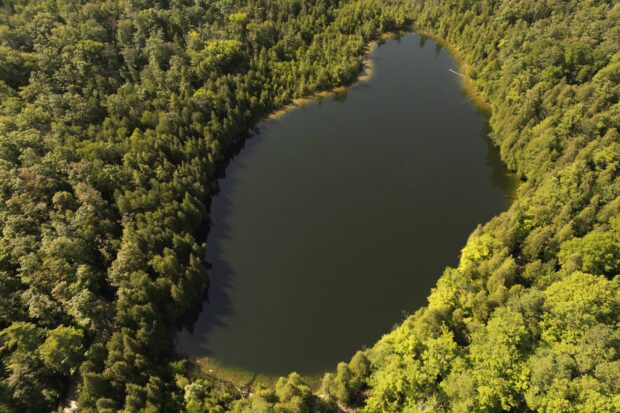Crawford Lake, located in Milton, Ontario, Canada, is surrounded by beautiful trees. The significance of this picturesque location goes beyond its natural beauty. A team of scientists is proposing that the start of a new geological epoch, known as the Anthropocene, should be commemorated at Crawford Lake. The Anthropocene, derived from the Greek words for “human” and “new,” represents the period since the mid-20th century when humans have had an unprecedented and lasting impact on the Earth.
The evidence of this impact can be seen globally through climate change, species loss, and pollution resulting from activities such as burning fossil fuels, nuclear weapons testing, and the use of fertilizers and plastics. However, the scientists have chosen Crawford Lake as the site for a historic marker due to its unique attributes. This 79-foot deep lake measuring 25,800 square feet offers a preserved record of annual deposits that clearly demonstrate the effects of human activity on the Earth’s soil, atmosphere, and biology. From nuclear fallout to species-threatening pollution and rising temperatures, Crawford Lake tells the story of how humans have overwhelmed the Earth system.
Comparing the power of humans to the meteorite that wiped out the dinosaurs and ushered in the Cenozoic Era, the scientists acknowledge that while humans have initiated a new epoch, it is not on the same scale as a geological era. To determine a specific start date for the Anthropocene, the working group plans to measure plutonium levels at the bottom of Crawford Lake.
The concept of the Anthropocene was first proposed over two decades ago by the late Nobel Prize-winning chemist, Paul Crutzen. Since then, scientists have debated its necessity, leading to the establishment of this working group. The choice of Crawford Lake as the starting point for the Anthropocene epoch lies in its well-preserved annual records that vividly capture the effects of human activity.
The Anthropocene serves as a reminder of the power and hubris of humankind. While our ability to transform the environment continues to surpass our understanding of the consequences, it is crucial to address the harmful aspects of our activities, particularly the disruptive climate change we are currently facing.
Geologically, the Anthropocene represents a new epoch following the Holocene Epoch, which began around 11,700 years ago. The proposed name for this new age is “Crawfordian,” paying homage to the lake that marks its beginning. However, the proposal still requires approval from various groups of geologists and will be discussed further at a major conference in the coming year.
In the long term, if climate change results in the disappearance of the permanent ice on Earth’s poles, a larger and more significant time measurement, such as a period, may need to be established to account for the Anthropocene. The recognition of this epoch serves as a cautionary tale, reminding us of the delicate balance between human progress and the preservation of our planet. It is a call to action to address environmental concerns and pave the way for a more sustainable future.
Denial of responsibility! VigourTimes is an automatic aggregator of Global media. In each content, the hyperlink to the primary source is specified. All trademarks belong to their rightful owners, and all materials to their authors. For any complaint, please reach us at – [email protected]. We will take necessary action within 24 hours.


